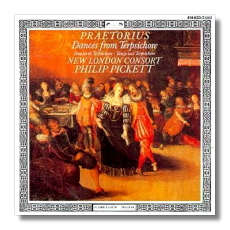
The Internet's Premier Classical Music Source
Related Links
- Latest Reviews
- More Reviews
-
By Composer
-
Collections
DVD & Blu-ray
Books
Concert Reviews
Articles/Interviews
Software
Audio
Search Amazon
Recommended Links
Site News
 CD Review
CD Review
Michael Praetorius

Dances from Terpsichore, 1612
New London Consort/Philip Pickett
l'Oiseau-Lyre 414633-2
Summary for the Busy Executive: Dance, clarion air.
I caught the Renaissance bug in high school, almost predictably because a girl to whom I had sworn Eternal Mute Devotion was interested. The girl soon faded from my life, but the music stuck. I learned to play the recorder badly. I sang in small madrigal groups. I began following early-music groups, which in my day (the Pleistocene era) meant the New York Pro Musica, the Deller Consort, the Studio der frühen Musik, and Musica Reservata. David Munrow soared over the firmament about a decade later. I sang in scholarly Renaissance-music groups. I studied so-called "Palestrina" counterpoint in college (about the only music course I took that did me any practical good). I made my way through Gustave Reese's history. But before all that, of course, I had heard, around age nine, Michael Praetorius's arrangement of the tune "Es ist ein Ros' entsprungen" - to me, three minutes of perfect part-writing. I got the shiver of recognition when a work of art immediately melds into your DNA. Still, most of Praetorius remained the province of specialists and scholars. In college, as a kind of performing adjunct to said specialists and scholars, I encountered the monumental Syntagma Musicum - Praetorius's attempt to write down all that was known about music and instruments - and got to know some of the imposing polychoral motets from Musae Sionae, part-writing that stood in the same relation to "Es ist ein Ros" as Rodin's "Gates of Hell" does to a Meisen figurine.
Praetorius had the temperament of an encyclopedist. In Terpsichore, he collects and arranges many examples of French popular dances, and strives to include all types. It's not particularly profound music. Renaissance composers generally reserved their serious mode for the church - mainly choral works. But most of us listen to music for pleasure as well as for spiritual enlightenment and thank goodness. I can think of nothing more dispiriting than having to listen to music out of a sense of duty and self-improvement. Besides, most educated people seriously underrate the spiritual value of fun. These works certainly lighten one's step. I've played this CD almost constantly for the last couple of weeks and haven't tired of it yet. In fact, I'm listening to it as I write.
What really gets me about the early-music movement is how instrumental technique has improved since the days I and other amateurs tootled, plinked, and foofed. As to authenticity, I can't say very much. Pickett tends to run disparate dances together. The wholes satisfy, but they are synthetic, the result of Pickett's scissors and paste. Furthermore, Renaissance composers seldom assigned specific instruments to parts. People tended to play the music with whatever instruments were handy and of suitable range. Consequently, one depends a great deal on the taste of the editor, perhaps as much as one depends on the composer. At one point, Pickett uses modern strings and at another a xylophone. It may not be authentic, but it is indeed beautiful. The Renaissance brass players are superb: you'd swear you were listening to modern valved instruments, so round and secure is their tone. And right now we enjoy a bumper crop of superb lutenists - those who not only get the notes, but play musically. I single out Tom Finucane and Paula Chateauneuf here.
Quality of recorded sound is high - clear, without excessive brightness - and balances bear some resemblance to real life.
Copyright © 1998, Steve Schwartz


















